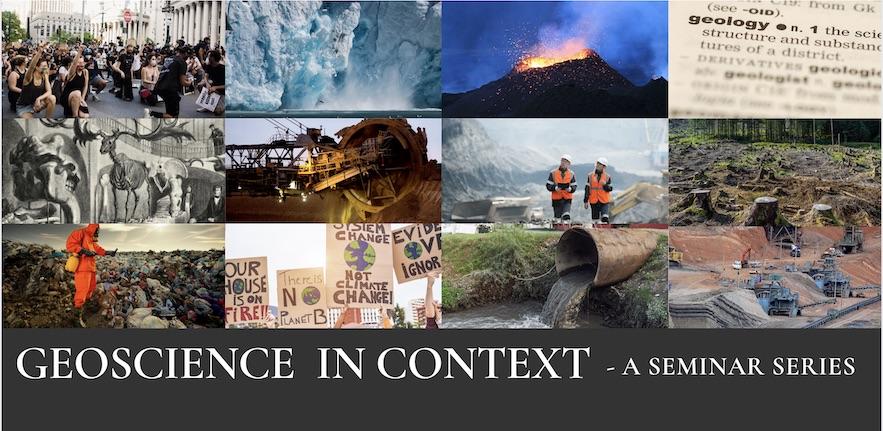
Geoscience in Context is a seminar series and discussion group in the Department of Earth Sciences that intends to broaden departmental understanding of geoscience’s place in society, the history of the subject, its modern practice and its role in shaping the future. The series aims to provide human context for the scientific research of the department, and to provide a safe, open and supportive forum for discussion of these topics.
A number of the Geoscience in Context talks have been recorded and are available through the Department Youtube channel:
Our aims are:
- To use the seminars and discussions as an opportunity for mutual education, as expert speakers and attendees bring their experiences and perspectives on various aspects of geoscience’s past and present place in society.
- To include and listen to members of the whole department in the discussions.
- To provide a basis for understanding issues of systemic and historic injustice and how these issues have affected the study and practice of geoscience.
- To provide a forum for discussion and education on contemporary and pressing issues (e.g., Black Lives Matter in the context of geoscience).
- To highlight the diverse backgrounds and experiences of people in geosciences, discuss the barriers to career progression and education, and how these barriers have been, or may be, overcome.
- Ensure that undergraduates and postgraduates are exposed to the broader potential of a geoscience degree and its applicability towards non-geoscience-related career paths.
- To contribute to creating a working environment that is inclusive and diverse, and support the department’s broader Equality and Diversity agenda.
- To encourage intellectual curiosity about the social, political, historical and philosophical context of geoscience.
- To have Geoscience in Context continue through term time in some fraction of the regular downtown departmental seminar slots.
- To continuously improve the seminar series in response to feedback on both the content and the format of sessions from attendees and presenting speakers.
Code of Conduct
Participation by people from a wide range of backgrounds, experiences and perspectives is a key aspect of this series, and these guidelines set out the expectations of participants in order to ensure that discussion is respectful, constructive and inclusive. We are committed to maintaining a harassment-free environment and will not tolerate behaviour that may reasonably be assumed to create or contribute to an environment hostile to a person or a group.
By participating in this seminar series as a speaker or an audience member you agree to abide by the guidelines set out below. The code of conduct applies during the seminar, and to any post-Geoscience in Context events, including, but not limited to, text discussion, facebook chat with posted videos, and tagged Twitter posts.
- We are committed to maintaining a harassment-free environment. All attendees commit to treating each other with respect and dignity irrespective of personal or academic differences. This means:
-
- Listen respectfully, without interrupting.
- Listen actively and with the intention of understanding others' views.
- Criticise ideas, not individuals.
- Commit to learning, not debating.
- Do not ask individuals to speak for their (perceived) social group.
- Validate, encourage and express admiration and appreciation to participants who speak when it feels unsafe to do so—be kind.
- Acknowledge that it is the impact of your statements which matters, not their intent.
- Apologise when you make a mistake.
- Be kind to those that make a mistake.
- Allow others to learn what you know.
- It is our priority that this discussion always respects the cultural, religious, ethnic and gendered differences of participants. Misogynist, homophobic, transphobic, ableist, racist or other discriminatory language will not be tolerated.
- Respect the chair’s decisions regarding who speaks. The chair will ensure that all have the opportunity to speak, and not be disadvantaged by existing power structures or by belonging to groups whose voices are less well-represented in the department dialogue.
- Participants may not record or photograph any material associated with the seminars. An official recording of talks may be made available with the permission of the speakers. The option of not recording talks ensures that unpublished work is protected and attribution to the original author is maintained. Discussion following talks will not be recorded. Not recording discussion ensures an open environment for discussion and learning.
This seminar series aims to enable discussion about relevant issues towards the geosciences. Participants will be encouraged to contribute towards discussion both during the seminar session and to inform themselves and others further about discussion topics and how they are relevant to the geosciences.
